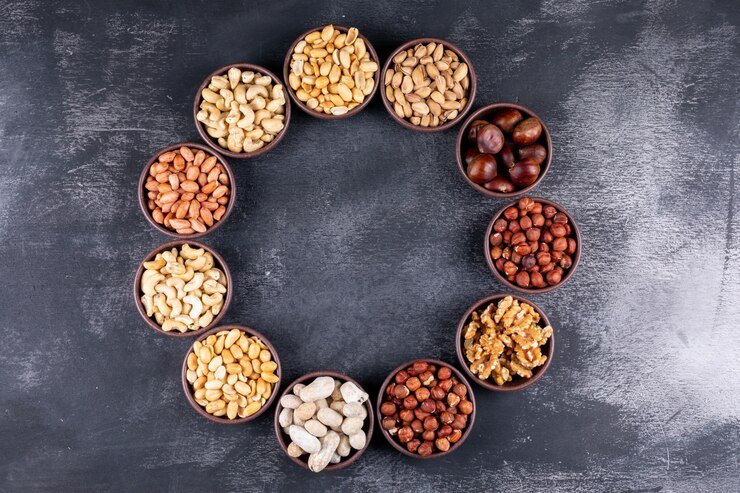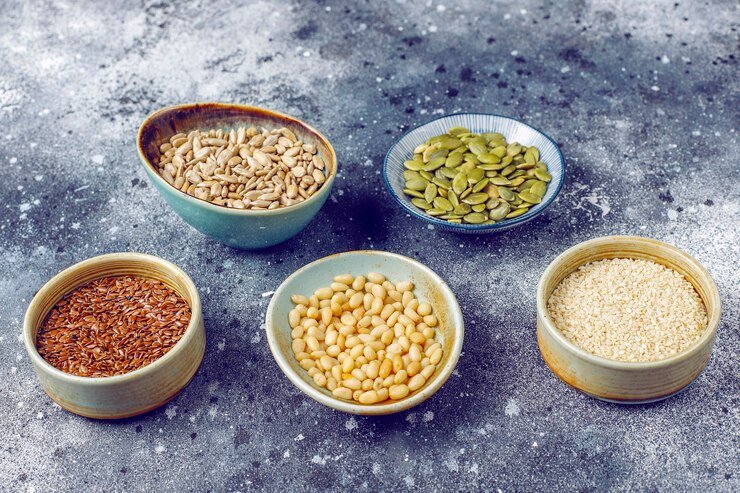Healthy eating is not just about staying fit or losing weight; it’s a long-term commitment to nourishing your body. Amidst a plethora of dietary trends, identifying staple foods that you should consume daily can simplify your choices and significantly improve your well-being. This article delves into five essential foods you should include in your daily diet and explores their numerous health benefits.
Key Takeaway : 5 Foods You Should Eat Every Day
- Leafy Greens (e.g., Spinach, Kale): Packed with vitamins, minerals, and antioxidants, they support overall health, including brain, heart, and immune function.
- Berries (e.g., Blueberries, Strawberries): Rich in antioxidants and fiber, they promote heart health, brain health, and help fight inflammation.
- Nuts and Seeds (e.g., Almonds, Chia Seeds): High in healthy fats, protein, and nutrients like magnesium and omega-3s, they support heart and brain health.
- Whole Grains (e.g., Oats, Quinoa): A great source of fiber and essential nutrients, they aid digestion and provide long-lasting energy.
- Fermented Foods (e.g., Yogurt, Kimchi): Contain probiotics that promote gut health, enhance digestion, and boost immunity.
1. Leafy Greens: The Nutritional Powerhouses
Why Leafy Greens?
Leafy greens, such as spinach, kale, Swiss chard, and arugula, are a cornerstone of a healthy diet. Packed with essential nutrients, these greens are low in calories but high in vitamins, minerals, and antioxidants.
Health Benefits:
- Rich in Nutrients: Leafy greens are abundant in vitamin K, which supports bone health, and vitamin A, which boosts vision and immune function.
- High in Antioxidants: They contain beta-carotene and lutein, which protect against cellular damage and chronic diseases.
- Improved Digestion: Their high fiber content supports gut health and prevents constipation.
- Heart Health: Nitrates found in greens help regulate blood pressure and improve arterial function.
How to Incorporate Leafy Greens Daily:
- Add spinach to your morning smoothie.
- Include a mixed greens salad with lunch or dinner.
- Stir kale or Swiss chard into soups, stews, or pasta dishes.
2. Nuts and Seeds: Small but Mighty

Why Nuts and Seeds?
Nuts and seeds, such as almonds, walnuts, chia seeds, and flaxseeds, pack a punch of healthy fats, protein, and fiber. Despite their small size, they provide a wealth of nutrients essential for overall health.
Health Benefits:
- Heart Health: Rich in monounsaturated and polyunsaturated fats, nuts and seeds help lower bad cholesterol (LDL) and increase good cholesterol (HDL).
- Brain Function: Omega-3 fatty acids in walnuts and flaxseeds enhance cognitive function.
- Weight Management: Their protein and fiber content promote satiety, helping to control hunger.
- Anti-inflammatory Properties: They contain antioxidants like vitamin E, which reduce inflammation and combat oxidative stress.
How to Incorporate Nuts and Seeds Daily:
- Sprinkle chia seeds or flaxseeds on oatmeal, yogurt, or smoothies.
- Snack on a handful of mixed nuts.
- Add almonds or sunflower seeds to salads for a crunchy texture.
3. Berries: Nature’s Sweet Treat
Why Berries?
Berries, including blueberries, strawberries, raspberries, and blackberries, are among the most nutrient-dense fruits. Their vibrant colors indicate high levels of antioxidants and phytonutrients.
Health Benefits:
- Rich in Antioxidants: Berries contain anthocyanins, which protect against oxidative stress and reduce inflammation.
- Heart Health: Regular consumption helps lower blood pressure and improve cholesterol levels.
- Skin Health: Vitamin C in berries promotes collagen production, keeping skin youthful and radiant.
- Blood Sugar Regulation: Their low glycemic index makes them a perfect snack for people with diabetes.
How to Incorporate Berries Daily:
- Top your morning cereal or yogurt with a mix of fresh berries.
- Blend them into smoothies for a refreshing drink.
- Enjoy them as a standalone snack or dessert.
4. Whole Grains: The Energy Boosters

Why Whole Grains?
Whole grains, such as oats, quinoa, brown rice, and whole wheat, are rich in complex carbohydrates, fiber, and essential nutrients. Unlike refined grains, they retain their bran, germ, and endosperm, offering a complete nutritional package.
Health Benefits:
- Sustained Energy: The complex carbs in whole grains provide a steady release of energy throughout the day.
- Digestive Health: Their high fiber content aids digestion and promotes a healthy gut microbiome.
- Heart Health: They help lower bad cholesterol and regulate blood sugar levels.
- Weight Management: Whole grains keep you feeling fuller for longer, reducing the urge to overeat.
How to Incorporate Whole Grains Daily:
- Start your day with a bowl of oatmeal.
- Use quinoa or brown rice as a base for lunch or dinner dishes.
- Replace refined bread and pasta with whole-grain alternatives.
5. Yogurt: The Probiotic Champion

Why Yogurt?
Yogurt, especially those with live and active cultures, is a rich source of probiotics, protein, and calcium. It is a versatile food that caters to various dietary preferences.
Health Benefits:
- Gut Health: Probiotics in yogurt promote a healthy balance of gut bacteria, aiding digestion and boosting immunity.
- Bone Health: High calcium content strengthens bones and teeth.
- Weight Management: Yogurt’s protein keeps you satiated and supports muscle repair.
- Improved Metabolism: It aids in nutrient absorption and overall metabolic function.
How to Incorporate Yogurt Daily:
- Enjoy it as a breakfast bowl with granola and fresh fruit.
- Use it as a base for smoothies or salad dressings.
- Have a small serving as a post-dinner dessert.
Also Read : 7 Delicious Frittata Recipes For Any Meal!
Conclusion
Incorporating these five foods into your daily diet is a step towards improved health and well-being. Leafy greens, nuts and seeds, berries, whole grains, and yogurt provide a balance of essential nutrients that support heart health, brain function, digestion, and more. By making them a regular part of your meals, you lay a strong foundation for a healthier, happier life. Remember, consistency is key, and small, sustainable changes can yield long-term benefits.
FAQs
1. Can I substitute other foods for the ones mentioned?
Yes, while the foods listed are highly beneficial, you can substitute them with similar nutrient-dense options. For instance, you can replace spinach with bok choy or kale and yogurt with kefir.
2. Are these foods suitable for people with dietary restrictions?
Most of these foods can be adjusted to fit dietary needs. For example, opt for plant-based yogurt if you’re lactose intolerant or vegan, and choose gluten-free grains like quinoa if you have gluten sensitivity.
3. How much of these foods should I consume daily?
- Leafy greens: Aim for 1-2 servings (about 1-2 cups).
- Nuts and seeds: About a handful or 1 ounce.
- Berries: 1 cup of fresh or frozen.
- Whole grains: 3-4 servings, depending on your energy needs.
- Yogurt: 1 cup, preferably low-fat or unsweetened.
4. Can children eat these foods daily?
Absolutely! These foods are highly beneficial for children as well. Adjust portion sizes based on their age and nutritional requirements.
5. Are there any precautions to consider?
While these foods are healthy, moderation is crucial. Overconsumption of nuts, for instance, can lead to excess calorie intake, and flavored yogurts may contain added sugars. Always choose whole, minimally processed options for the best results.








Leave A Comment